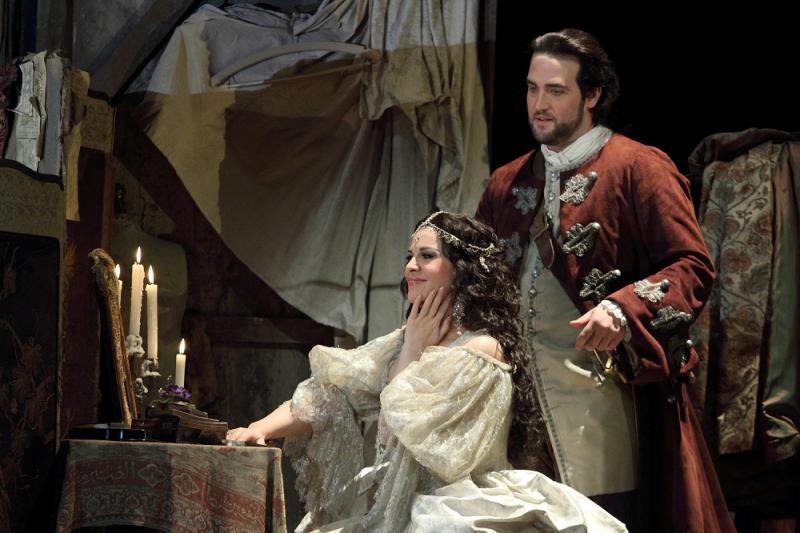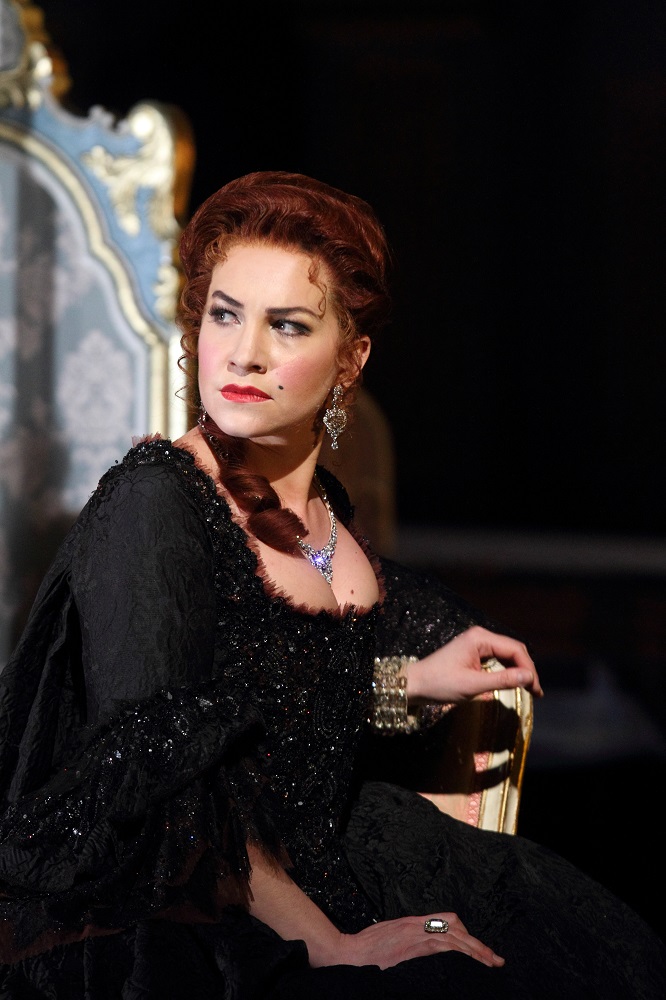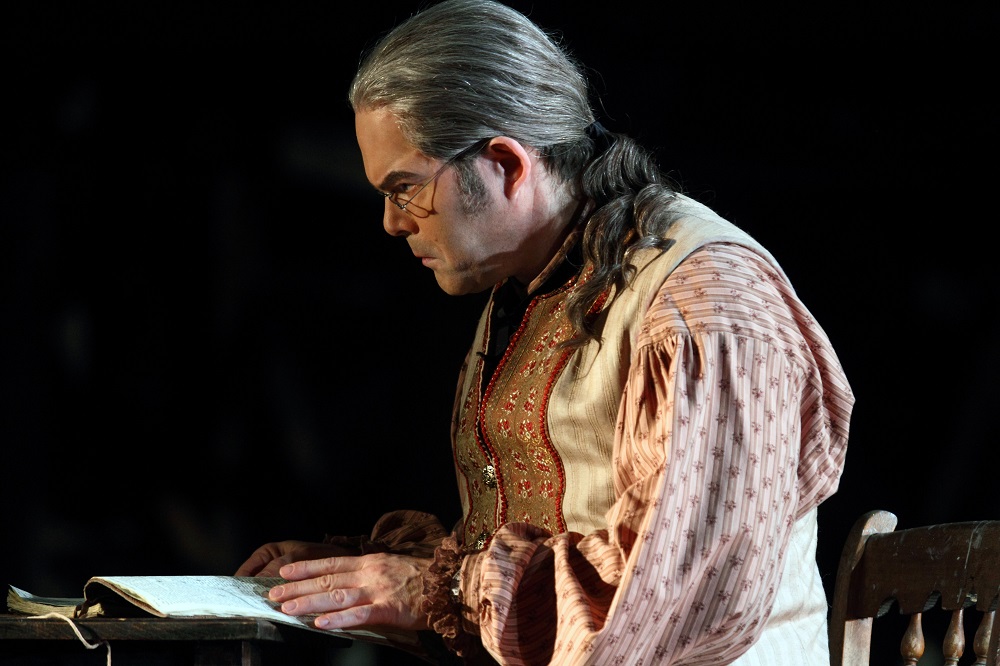Adriana Lecouvreur, Royal Opera | reviews, news & interviews
Adriana Lecouvreur, Royal Opera
Adriana Lecouvreur, Royal Opera
Engaging if little-known work shines in well-cast revival

Adriana Lecouvreur deserves to be better known. The opera has a toe-hold in the repertoire, with occasional appearances, usually as a showcase for the soprano in the title role.
This production, directed by David McVicar and with sets by Charles Edwards, was first staged in 2010 and is returning to Covent Garden for a first revival. It is a spectacular affair, if uncontroversial in its period stylings, but the straightforward presentation only emphasises how the opera can stand on its own merits. And the cast assembled for the revival is superb, a mix of big stars and little-known names, but all perfectly matched to their roles.
 The story concerns an actress, Adriana (Angela Gheorghiu) in 18th century Paris, who is in love with Maurizio, Count of Saxony (Brian Jagde), but who has a rival in the Princess de Bouillon (Ksenia Dudnikova, pictured right). The other major characters are the theatre manager, Michonnet (Gerald Finley), who is also in love with Adriana, and the princess’s husband, the Prince de Bouillon (Bálint Szabó). Over the course of four substantial acts – it’s a long opera, but it flies – the love triangle plays out in a series of theatrical and aristocratic settings.
The story concerns an actress, Adriana (Angela Gheorghiu) in 18th century Paris, who is in love with Maurizio, Count of Saxony (Brian Jagde), but who has a rival in the Princess de Bouillon (Ksenia Dudnikova, pictured right). The other major characters are the theatre manager, Michonnet (Gerald Finley), who is also in love with Adriana, and the princess’s husband, the Prince de Bouillon (Bálint Szabó). Over the course of four substantial acts – it’s a long opera, but it flies – the love triangle plays out in a series of theatrical and aristocratic settings.
In the first act, we are backstage at Adriana’s theatre. McVicar and Edwards present a full-sized wooden frame for a theatre stage as the backdrop, facing away from us, but rotated to different angles to furnish the various palaces and homes of the later acts, including a private theatre in the third, with the stage now facing the audience – this the setting for a ballet scene, brilliantly integrated into the narrative as a fracas in the onstage audience returns attention to the story, even as the dancers continue their act. It all ends tragically, of course, and while Adriana’s death scene, in the arms of her now reconciled lover, is protracted, Cilea is able to maintain the emotion, and the dramatic pretence, right up to the final bars.
Just as in 2010, this revival is primarily a platform for Angela Gheorghiu. Half of the cast sheet is given over to a tribute to the star soprano, which tells us that she has now been performing at Covent Garden for 25 years and has given nearly 150 performances there. It is pleasing to report, then, that her voice is as agile as ever, perhaps lacking the tonal purity of earlier years, but still elegant and distinctive. Adriana Lecouvreur isn’t a particularly taxing role, technically, but it requires a broad range of tone and expression, all of which Gheorghiu delivers with ease. An innovative conceit of the opera is that, when Adriana performs her theatrical roles, her lines are spoken over music, and Gheorghiu has an impressive ability to exploit the dramatic potential. Very little of the role is particularly high or loud, but Gheorghiu is always able to command the ensemble, even at moderate dynamics.
For the tenor role of Maurizio, the Royal Opera has made an impressive find with Brian Jagde. He has a voice of astonishing projection and power, and he is able to convey all the emotion that the role requires. He is sometimes a little lacking in finesse, swooping up to high notes or attacking fortissimo entries with unnecessary brutality, but the sheer dramatic impact of his singing makes him a huge asset here. Definitely a name to watch. Bálint Szabó is the main bass presence, as the jilted Prince de Bouillon, with a rich, even tone, satisfying and authoritative. Just a shame we heard so little of him.

The Michonnet of Gerald Finley, by contrast, is an almost ubiquitous presence throughout the opera (pictured above), his role a kind of chaperone and confidente of the heroine. Finley was in excellent voice last night. If, like me, you are more used to hearing him in Wagner and German Lieder, you’ll be impressed by the fluency and elegance of his Italian – clearly a versatile performer. He has excellent diction too, and he can really act. Ksenia Dudnikova brings a deliciously sinister mezzo to the role of the love rival. Her tone is Slavic – edgy and occasionally caustic – but ideal for the role.
Conductor Daniel Oren gives a proficient account of the score. He sometimes seemed to rush the singers, and some of the climaxes didn’t sparkle as they might, but the singing always held together, and the orchestra was on top form throughout. A great ensemble show then, with an impressive cast from top to bottom. It’s the ideal platform for Gheorghiu, but she is far from the only attraction here.
- Adriana Lecouvreur at the Royal Opera until 2 March
- Read the review of the original production
- More opera reviews on theartsdesk
rating
Explore topics
Share this article
Subscribe to theartsdesk.com
Thank you for continuing to read our work on theartsdesk.com. For unlimited access to every article in its entirety, including our archive of more than 15,000 pieces, we're asking for £5 per month or £40 per year. We feel it's a very good deal, and hope you do too.
To take a subscription now simply click here.
And if you're looking for that extra gift for a friend or family member, why not treat them to a theartsdesk.com gift subscription?
more Opera
 L'Olimpiade, Irish National Opera review - Vivaldi's long-distance run sustained by perfect teamwork
Sporting confusions and star-crossed lovers clarified by vivacious singing and playing
L'Olimpiade, Irish National Opera review - Vivaldi's long-distance run sustained by perfect teamwork
Sporting confusions and star-crossed lovers clarified by vivacious singing and playing
 Remembering conductor Andrew Davis (1944-2024)
Fellow conductors, singers, instrumentalists and administrators recall a true Mensch
Remembering conductor Andrew Davis (1944-2024)
Fellow conductors, singers, instrumentalists and administrators recall a true Mensch
 Götterdämmerung, LPO, Jurowski, RFH review - outside looking and listening in, always with fascination
Every orchestral phrase and colour perfect, vocal drama often a notch below
Götterdämmerung, LPO, Jurowski, RFH review - outside looking and listening in, always with fascination
Every orchestral phrase and colour perfect, vocal drama often a notch below
 Simon Boccanegra, Hallé, Elder, Bridgewater Hall, Manchester review - thrilling, magnificent exploration
Verdi’s original version of the opera brought to exciting life
Simon Boccanegra, Hallé, Elder, Bridgewater Hall, Manchester review - thrilling, magnificent exploration
Verdi’s original version of the opera brought to exciting life
 Aci by the River, London Handel Festival, Trinity Buoy Wharf Lighthouse review - myths for the #MeToo age
Star singers shine in a Handel rarity
Aci by the River, London Handel Festival, Trinity Buoy Wharf Lighthouse review - myths for the #MeToo age
Star singers shine in a Handel rarity
 Carmen, Royal Opera review - strong women, no sexual chemistry and little stage focus
Damiano Michieletto's new production of Bizet’s masterpiece is surprisingly invertebrate
Carmen, Royal Opera review - strong women, no sexual chemistry and little stage focus
Damiano Michieletto's new production of Bizet’s masterpiece is surprisingly invertebrate
 La scala di seta, RNCM review - going heavy on the absinthe?
Rossini’s one-acter helps young performers find their talents to amuse
La scala di seta, RNCM review - going heavy on the absinthe?
Rossini’s one-acter helps young performers find their talents to amuse
 Death In Venice, Welsh National Opera review - breathtaking Britten
Sublime Olivia Fuchs production of a great operatic swansong
Death In Venice, Welsh National Opera review - breathtaking Britten
Sublime Olivia Fuchs production of a great operatic swansong
 Salome, Irish National Opera review - imaginatively charted journey to the abyss
Sinéad Campbell Wallace's corrupted princess stuns in Bruno Ravella's production
Salome, Irish National Opera review - imaginatively charted journey to the abyss
Sinéad Campbell Wallace's corrupted princess stuns in Bruno Ravella's production
 Jenůfa, English National Opera review - searing new cast in precise revival
Jennifer Davis and Susan Bullock pull out all the stops in Janáček's moving masterpiece
Jenůfa, English National Opera review - searing new cast in precise revival
Jennifer Davis and Susan Bullock pull out all the stops in Janáček's moving masterpiece
 theartsdesk in Strasbourg: crossing the frontiers
'Lohengrin' marks a remarkable singer's arrival on Planet Wagner
theartsdesk in Strasbourg: crossing the frontiers
'Lohengrin' marks a remarkable singer's arrival on Planet Wagner
 Giant, Linbury Theatre review - a vision fully realised
Sarah Angliss serves a haunting meditation on the strange meeting of giant and surgeon
Giant, Linbury Theatre review - a vision fully realised
Sarah Angliss serves a haunting meditation on the strange meeting of giant and surgeon

Add comment